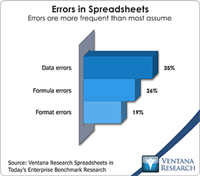Banking giant JP Morgan raised eyebrows in 2012 when it revealed that it had lost a substantial amount of money because of poorly conceived trades it had made for its own account. The losses raised questions about the adequacy of its internal controls, and broader questions about the need for regulations to reduce systemic risk to the banking system. At the heart of the matter were the transactions made by “the London Whale,” the name given to a JP Morgan’s trading operation in the City by its...
Read More
Topics:
Sales,
Sales Performance,
GRC,
Office of Finance,
error,
Operational Performance,
Business Analytics,
Business Collaboration,
Business Intelligence,
Business Performance,
Financial Performance,
Information Management,
Data,
controls
I recently spoke with Oversight Systems, an operational intelligence analytics company that uses predictive analytics and optimization to help companies save money, reduce the risk of loss and fraud, and reinforce corporate governance and compliance efforts. Ventana Research views operational intelligence as an emerging technology with the potential for a high return on investment. By continuously monitoring activities in a company’s IT systems, Oversight’s Web-based software continuously,...
Read More
Topics:
Big Data,
Predictive Analytics,
Sales Performance,
Supply Chain Performance,
Fraud,
Governance,
GRC,
Office of Finance,
audit,
Operational Performance,
Analytics,
Business Analytics,
Business Performance,
Cloud Computing,
Financial Performance,
Governance, Risk & Compliance (GRC),
Information Management,
Operational Intelligence,
controls,
Oversight Systems
I recently attended Vision 2012, IBM’s conference for users of its financial governance, risk management and performance optimization software. I reviewed the finance portion of the program in a previous blog. I’ve been commenting on governance, risk and compliance (GRC) for several years, often with the caveat that GRC is a catch-all term invented by industry analysts initially to cover a broad set of individual software applications. Each of these was designed to address specific requirements...
Read More
Topics:
Governance,
GRC,
Office of Finance,
OpenPages,
Operational Performance,
Analytics,
Business Collaboration,
Business Performance,
Financial Performance,
IBM,
compliance,
controls,
IT controls
My colleague Mark Smith and I have frequently commented on the artificiality of the emerging software category governance, risk and compliance (GRC). To be sure, once stand-alone categories of software (IT governance, audit documentation and industry-specific compliance management, to name three examples) have started what I expect to be a long convergence process. Moreover, since just about all controls and risk management efforts require a secure IT environment to be effective, there is a...
Read More
Topics:
Customer Experience,
Governance,
GRC,
Office of Finance,
enterprise risk management,
ERM,
Operational Performance,
Business Performance,
Financial Performance,
compliance,
Risk,
controls,
IT governance










